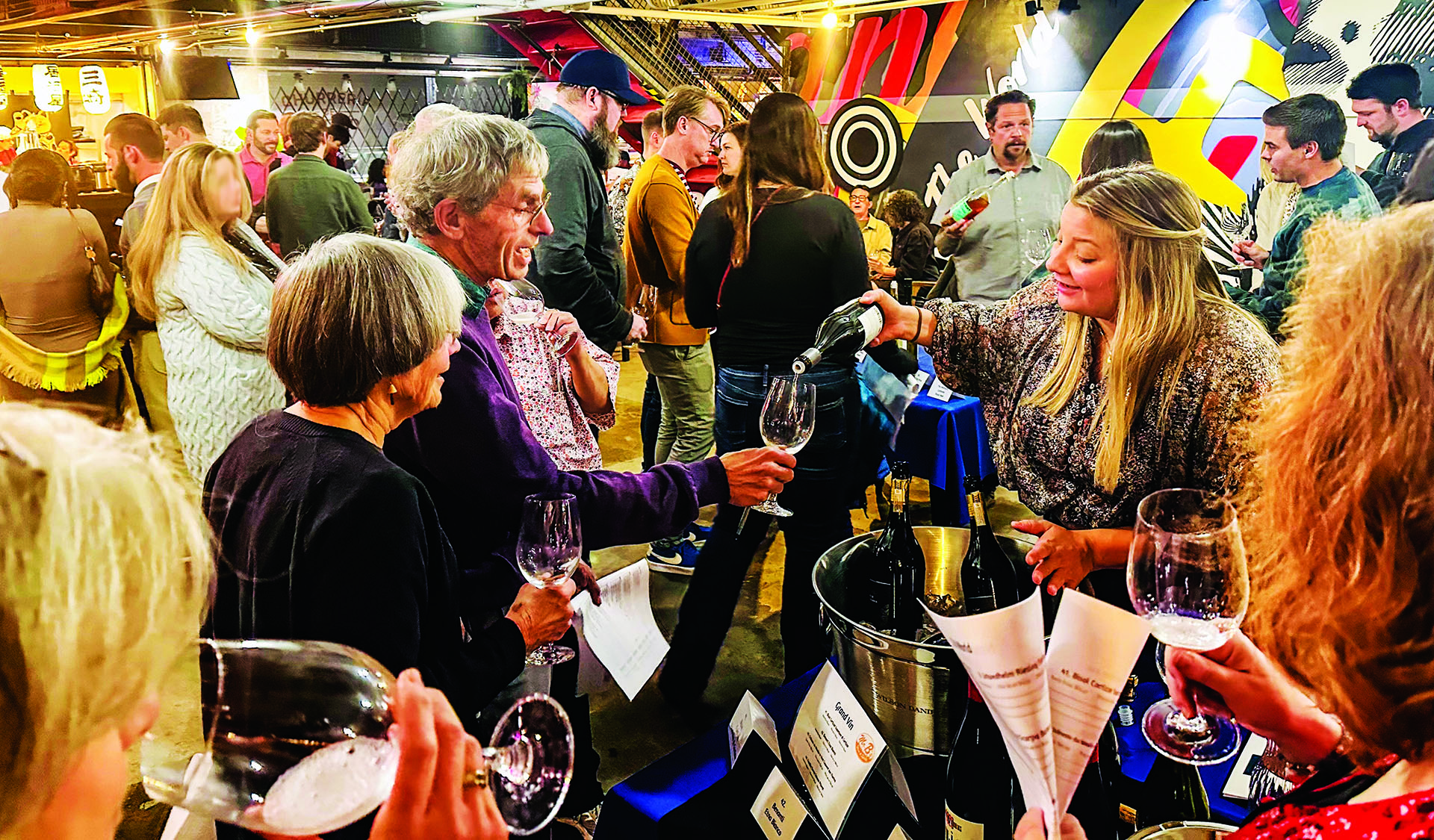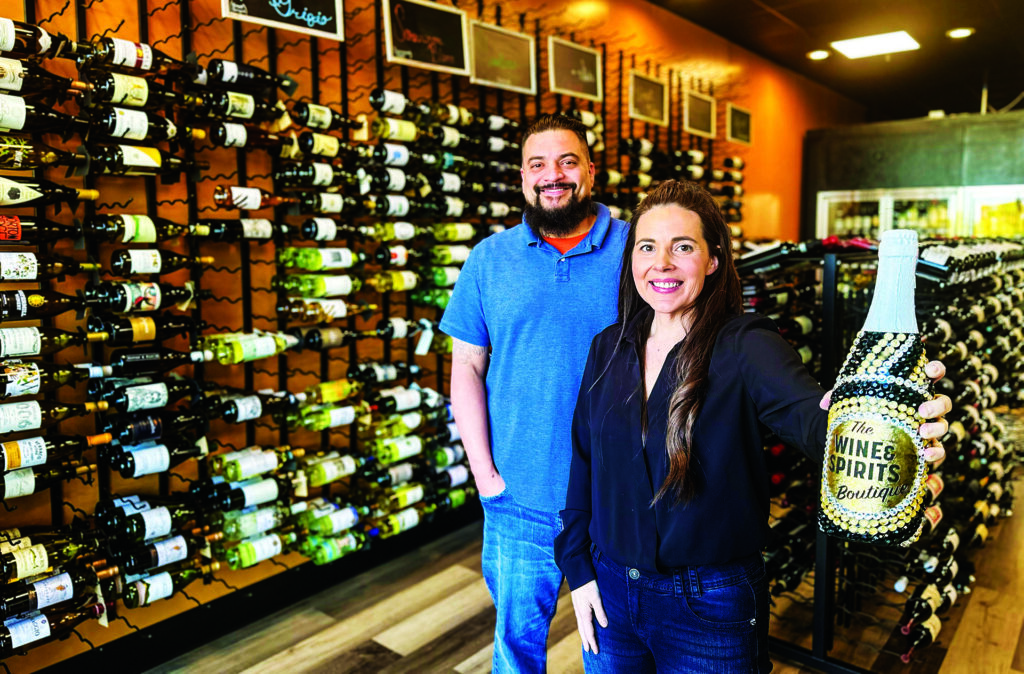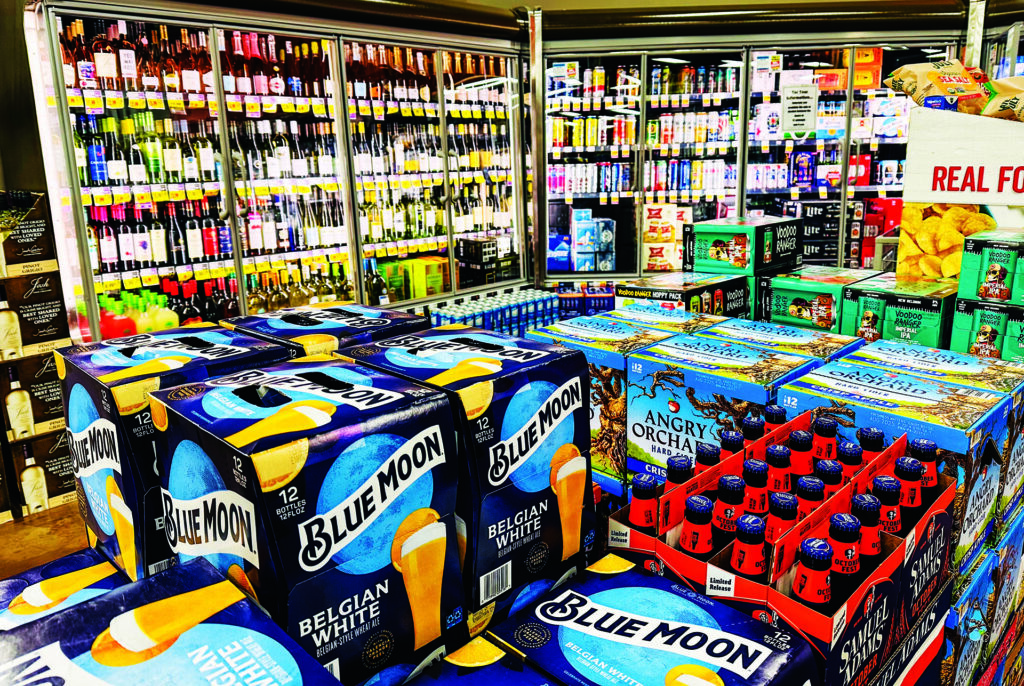
Mr. B’s Wine and Spirits hosted an evening wine tasting event at Stanley Marketplace in October. Local liquor stores are coming up with new ways to get in front of customers two years after the passage of Proposition 125, which allows wine sales in grocery stores.
Two years after Prop. 125’s approval, Colorado’s independent liquor and specialty stores are finding new ways to win customers back to their shops.
On the heels of election day 2022, Megan Bennett and Geno Anaya marked their signatures on a five-year lease for Wine and Spirits Boutique, located at 10355 E. MLK Jr. Blvd., across from the King Soopers store in Denver’s Central Park neighborhood.
“We were in it to win it,” Bennett says. But just as the duo had committed to a new business venture, so had Colorado voters to let grocery stores across Colorado sell wine, fundamentally changing how Wine and Spirits Boutique would do business.

Geno Anaya (left) and Megan Bennett, owners of The Wine & Spirits Boutique, stand before racks of wine bottles they say shoppers won’t find at the nearby grocery store.
Proposition 125 passed in 2022 with 51 percent of the vote. Two other alcohol-related ballot questions—raising the number of liquor licenses that a single store owner could hold and allowing retail establishments to sell liquor offsite and offer takeout and delivery—failed by close margins. The following March, wine began appearing on grocery shelves across the state, prompting Bennett, Anaya, and several other independent liquor store owners to shift their sales and marketing strategies.
“The grocery stores are changing their lineup about twice a year, so we don’t know what they’re going to pick the next time that they decide to change things up,” Anaya says. “So, when we talk to our distributors, we do try to select smaller vineyards that won’t mass produce wine, so it’ll never find its way into a grocery store.”
Bennett believes that no matter what they do, they won’t be able to win over all shoppers who find buying wine at a grocery store easier and more convenient. Others, she says, will always support smaller businesses.

Inside a Denver grocery store, a stack of beer meets shoppers at the end of the frozen food aisle. Nearby refrigerator cases are filled with bottles of chilled wine and more beer.
Proponents of the change said consumer convenience was the driving force behind the movement, while independent liquor stores feared they’d lose customers and face even tougher times following the Covid-19 pandemic and the expansion of beer sales in grocery stores in 2019.
Liquor store owners across the northeast Denver metro region say that, two years after the vote, they’re feeling the pressure from Prop. 125, but continue to offer experiences and expertise that grocery stores cannot.
“I don’t think there’s a specialty store that hasn’t been affected by it,” says Ryan Corey, director of operations at Mr. B’s Wine and Spirits, which has a location at Stanley Marketplace in northwest Aurora. “People are erring on the side of convenience and don’t think about the consequences of shopping for wine at the grocery store, but if you’re buying your wine at grocery stores, you’re supporting big corporations.”
As a result of Prop. 125, Mr. B’s has leaned even further into offering organic, all-natural wines that shoppers won’t find in grocery stores.
“There’s nothing unique about those mass-produced bottles of wine,” Corey adds. “We’re doing our best to educate consumers that convenience isn’t everything.”
While Corey says he can’t pinpoint exactly how much revenue has been negatively affected by Prop. 125, he believes it to be “significant.”
For Kate Conte, it was enough to get out of the liquor and wine business entirely.
Conte’s father opened Grape Expectations in Park Hill 24 years ago, but this past January, trying to make ends meet became too challenging, she says. The family sold the business.
“We really struggled to just stay relevant, and that ballot question was pretty much the final nail in the coffin for us. I hate to make it sound like it was that bad, but it was the last straw,” she says. “We were struggling already, and I had made a concerted effort to discontinue brands that were catered toward grocery stores. We lost a lot of customers because I didn’t have their favorite prosecco on the shelf, but I couldn’t compete on price.”
Liquor stores first saw a dip in business after supermarkets and convenience stores were allowed to sell full-strength beer, but overall, Conte says, the beer-drinking segment of consumers is smaller, so after six months or so, sales picked up again when customers realized they couldn’t find their favorite craft brews in grocery stores.
It’s unclear whether the same bounce back will happen with wine, but statewide advocates for the industry say there’s worry that grocery sales will continue to have an impact on liquor stores and the economy at large.
Liquor store closures can be difficult to track in real time because licenses are renewed on an annual basis, says Chris Carran, a board member of Colorado Independent Liquor Stores United and owner of Locals Liquors in Silverthorne. She worries, however, that an uptick in shop closures could have a chilling effect across the industry.
Liquor and specialty stores have contributed to what makes Colorado’s wine and spirit scene so innovative and exciting, she says. “These smaller guys can try something out in a smaller batch because they have a liquor store to put it in. A grocery store won’t take that.”
Mr. B’s and Wine and Spirits has upped their effort on this front by focusing on smaller wine brands, opting for quality over quantity. “There’s only so much real estate in those grocery stores, so they aren’t going to carry what we’re carrying,” Corey says.
If fewer people are visiting liquor stores because they can pick up a bottle of wine or six-pack at the grocery store, there’s “a huge trickle-down effect,” Carran adds.
There’s also the looming fear of losing liquor to grocery stores through a future law change. While there’s no official proposal or movement brewing yet, Carran and others say they’re sure it’s on the way. And they’ll be ready to fight again.
Proponents of Prop. 125 raised about $14.6 million in support of grocery sales of wine. Advocates backing independent liquor raised $903,000—a difference that doesn’t feel so bad considering how close the final vote count was, but still stings, Carran says, considering how much grocery sales have changed the game for her and her colleagues.
“We have to get the word out and focus on the employment—how many jobs will be lost, from liquor store employees to wholesalers, drivers—it’s huge,” Carran says. “If they go after liquor, we need to do what we did (with wine), but more.”
Linda Kotsaftis contributed to this story.
Front Porch photos by Christie Gosch




0 Comments